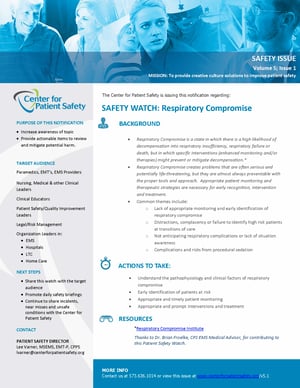
Respiratory Compromise is a state in which there is a high likelihood of decompensation into respiratory insufficiency, respiratory failure or death, but in which specific interventions (enhanced monitoring and/or therapies) might prevent or mitigate decompensation.
Respiratory Compromise creates problems that are often serious and potentially life-threatening, but they are almost always preventable with the proper tools and approach. Appropriate patient monitoring and therapeutic strategies are necessary for early recognition, intervention and treatment.
Common themes include:
- Lack of appropriate monitoring and early identification of respiratory compromise
- Distractions, complacency or failure to identify high risk patients at transitions of care
- Not anticipating respiratory complications or lack of situation awareness
- Complications and risks from procedural sedation
Actions to take:
- Understand the pathophysiology and clinical factors of respiratory compromise
- Early identification of patients at risk
- Appropriate and timely patient monitoring
- Appropriate and prompt interventions and treatment
RESOURCES
*Respiratory Compromise Institute
Thanks to Dr. Brian Froelke, CPS